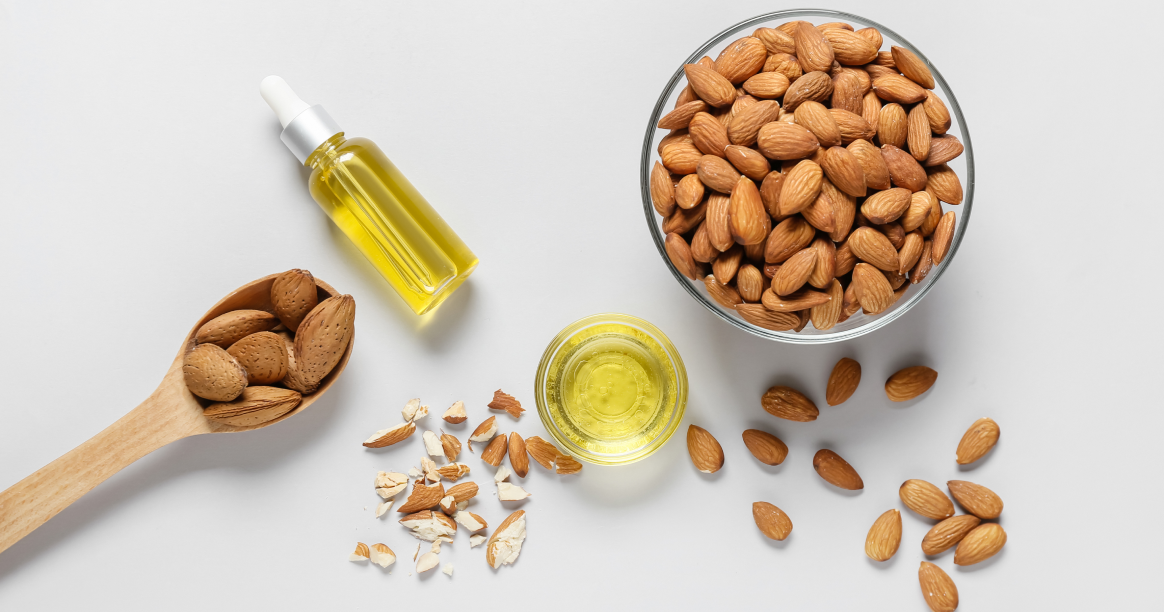All about almonds: Health and nutrition benefits

Almonds are highly nutritious tree nuts that have been cultivated and enjoyed for thousands of years. They originated in Iran but are now famous worldwide. Egypt’s King Tut even had almonds buried with him in his tomb.

Today, this nut is a crowd-pleaser around the globe. Almonds are widely used in foods like dairy-free milk, grain-free baking mixes, and nut butter blends because they’re versatile, filling, and nutritious.
Almond nutrition facts
Almonds are rich in vitamins, minerals, and antioxidants that support your health.[1,2,3] If you swap out your less nutritious snacks with a handful of almonds, it’s a convenient way to add extra nutrients to your meals.
A one-ounce serving of almonds (about 23 almonds) provides
- 6 grams of protein
- 14 grams of heart-healthy fat
- 3 grams of fiber
They’re rich in essential vitamins and minerals, like biotin, vitamin E, copper, manganese, phosphorus, and magnesium, that play a significant role in strengthening your immune system, keeping your bones healthy, and maintaining proper nerve function.[1]
But do you know what you won’t find in almonds? Plain almonds don’t have cholesterol or sodium. They’re low in saturated fat, carbohydrates, and sugar.
For the most nutritional benefits, stick to plain raw almonds and skip the flavored, oil-roasted types.
Curious about how almonds and other snacks you consume on the regular stack up nutritionally? Dive deeper with Simple’s Nutrition Scores. Take our Simple quiz to get started.

Almond health benefits
Cardiovascular health
Like other nuts and seeds, almonds are rich in healthy fats that may help lower the risk of cardiovascular diseases and improve cholesterol levels.[1,4,5,6]
Eating almonds can help you achieve healthier blood pressure, which can protect your cardiovascular system.[7] Almonds also have high levels of antioxidants, which can protect your heart and other tissues from oxidative damage.[8]
Diabetes and blood sugar
The healthy fiber and fats found in almonds may lower diabetes risk.[1] There’s a link between regular almond consumption and improved blood glucose control.
Almonds have a low glycemic load, so they help prevent diabetes by slowing the sugar rush into your bloodstream. Add almonds to a high-carbohydrate meal with protein and vegetables, and you’ll further lower the impact that carbohydrates have on your blood sugar.[9]
Weight loss
Eating almonds as part of a healthy diet can help you achieve a healthier weight and lower your chances of developing certain metabolic diseases.[1]
If you switch your high-carbohydrate snack with a serving of almonds, it may help you lose weight.[10] Just make sure you stick to a proper portion size of almonds, about one ounce, to help you meet your weight loss goals.
Beauty benefits
Almonds contain antioxidants that reduce UV damage to your skin and keep you looking young and healthy. Research on these antioxidants shows that regular almond consumption may reduce wrinkle severity by nourishing your skin and reducing aging signs.[11]
A one-ounce serving of almonds provides half of your daily biotin requirement. Biotin is a nutrient essential for the health of your skin, nails, and hair. A biotin deficiency can cause hair loss, among other symptoms.[12] Getting enough biotin from your food may help you maintain your luscious locks.
Check your portion size

More isn’t always better. Keep your almond consumption healthy by checking your serving size before you dig in. Almonds are high in healthy fats, which also makes them high in calories.
That standard, one-ounce, “about 23 nuts” serving has around 160 calories.
If you enjoy numbers, feel free to count them out. Or just stick to a small cupped handful as a tool to ensure you eat the right amount of almonds for your health goals.
That said, although nuts are calorie-dense, research suggests that including them in your diet won’t necessarily lead to weight gain.
People who include plain raw nuts and seeds in their roster tend to have lower body weight and less belly fat.[1,10] Possibly, almonds’ healthy fat and fiber content may mean you feel satisfied and eat less at other meals.[4]
Wondering how to make sure those almond servings stay just right? Let Simple be your guide. With our intuitive food journal, you can effortlessly track your almond intake, ensuring you benefit without overindulging. Get started by taking our Simple quiz, begin logging, and watch those nutrition goals flourish!
Selecting and storing
Choose fresh almonds and check the “use by” date on the package to ensure you’re getting the highest quality nuts available.
Oxygen, light, and heat can destroy the almond’s delicate fats, so avoid purchasing your almonds out of a bulk bin, as they tend to be exposed to more air. Stick to air-tight bags when you buy nuts.
If you buy almonds in the shell, they’ll last longer than the shelled varieties. If you want the convenience of shelled almonds, store them in a tightly sealed container in the refrigerator or freezer to keep them fresh for longer. Shelled almonds will last six months in the fridge or a year in the freezer.
Look for almonds that aren’t warped or shriveled and that are uniform in color. They should smell sweet and nutty, not bitter or rancid.
If you prefer the flavor and texture of roasted almonds, look for almonds that have been dry-roasted to avoid the extra oil. Also, read the label to make sure there’s no added sugar, corn syrup, or other ingredients.
How to enjoy your almonds
Almonds can be eaten raw, roasted, ground into butter or flour, or soaked and blended into plant-based milk. Each almond product has different uses and benefits.
- Chopped almonds: Try using a coffee grinder, food processor, or blender to chop almonds into smaller chunks and use them to top oatmeal, yogurt, salads, or baked goods.
- Almond butter: Ground, roasted almonds make delicious nut butter with a similar nutrient profile to peanut butter. Almond butter contains all the healthy fats and protein found in roasted almonds and provides about 180 calories per serving (2 tbsp.).
- Almond meal: Grinding whole, raw almonds creates a course meal to use in baking or as a coating (similar to breadcrumbs). Because it contains almond skins, it is more fibrous and has a chewier texture than almond flour. You can find almond meal in the health food or gluten-free section of most grocery stores. Or make your own using a coffee grinder, food processor, or good blender.
- Almond flour: Made from blanched almonds (aka the skins have been removed) and ground into a fine powder, almond flour is more delicate and lighter in color than almond meal. Traditional French macarons, cakes, and many gluten-free baking mixes use almond flour.
- Almond milk: Soaked almonds are blended, then strained to produce almond “milk” that’s lower in carbs, fat, and calories (around 30 calories per 8 ounces) than dairy milk. However, almond milk is much lower in protein than its dairy counterpart, so make sure you get enough protein from other sources. Look for almond milk that is unsweetened and contains added vitamin D and calcium for the best bang for your nutritional buck.
In the mood for almond-centric recipes or curious about more healthful bites? Explore Simple’s rich library of resources and delicious recipes. Take the first step on your wellness journey by taking Simple’s quiz today.

If portions are moderate, almonds (along with other nuts and seeds) can be an important part of a healthy weight-care nutrition plan.
The combination of protein, fiber, and healthy fats in almonds can promote feelings of fullness and reduce overeating.
- Barreca D, Nabavi SM, Sureda A, Rasekhian M, Raciti R, Silva AS, et al. Almonds (Prunus Dulcis Mill. D. A. Webb): A source of nutrients and health-promoting compounds. Nutrients. 2020 Mar 1;12(3).
- Richardson DP, Astrup A, Cocaul A, Ellis P. The nutritional and health benefits of almonds: A healthy food choice. Food Science & Technology Bulletin Functional Foods. 2009 Sep 1;6(4):41–50.
- Dreher ML. A comprehensive review of almond clinical trials on weight measures, metabolic health biomarkers and outcomes, and the gut microbiota. Nutrients. 2021 Jun 8;13(6).
- Guasch-Ferré M, Liu X, Malik VS, Sun Q, Willett WC, Manson JE, et al. Nut consumption and risk of cardiovascular disease. J Am Coll Cardiol. 2017 Nov 14;70(20):2519–32.
- Kalita S, Khandelwal S, Madan J, Pandya H, Sesikeran B, Krishnaswamy K. Almonds and cardiovascular health: A review. Nutrients. 2018 Apr 11;10(4).
- Sabaté J, Hook DG. Almonds, walnuts, and serum lipids. In: Handbook of Lipids in Human Nutrition. CRC Press; 2020. p. 137–44.
- Eslampour E, Asbaghi O, Hadi A, Abedi S, Ghaedi E, Lazaridi AV, et al. The effect of almond intake on blood pressure: A systematic review and meta-analysis of randomized controlled trials. Complement Ther Med. 2020 May;50:102399.
- Bolling BW, Chen CYO, McKay DL, Blumberg JB. Tree nut phytochemicals: composition, antioxidant capacity, bioactivity, impact factors. A systematic review of almonds, Brazils, cashews, hazelnuts, macadamias, pecans, pine nuts, pistachios, and walnuts. Nutr Res Rev. 2011 Dec;24(2):244–75.
- Josse AR, Kendall CWC, Augustin LSA, Ellis PR, Jenkins DJA. Almonds and postprandial glycemia–a dose-response study. Metabolism. 2007 Mar;56(3):400–4.
- Berryman CE, West SG, Fleming JA, Bordi PL, Kris-Etherton PM. Effects of daily almond consumption on cardiometabolic risk and abdominal adiposity in healthy adults with elevated LDL-cholesterol: A randomized controlled trial. J Am Heart Assoc. 2015 Jan 5;4(1):e000993.
- Foolad N, Vaughn AR, Rybak I, Burney WA, Chodur GM, Newman JW, et al. Prospective randomized controlled pilot study on the effects of almond consumption on skin lipids and wrinkles. Phytother Res. 2019 Dec;33(12):3212–7.
- Zempleni J, Wijeratne SSK, Hassan YI. Biotin. Biofactors. 2009 Jan-Feb;35(1):36–46.
